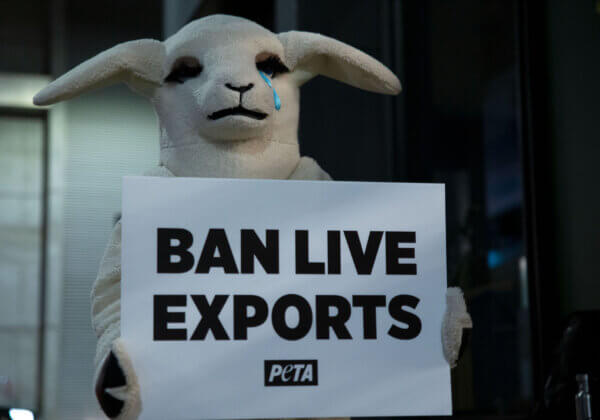Killing for a Living: Heartbreaking Confessions From Slaughterhouse Workers
Paul McCartney famously said that if slaughterhouses had glass walls, everyone would be a vegetarian. In Australia, more than 500 million animals are tormented and butchered in these facilities every year, yet very few of us see these animals in their final, desperate moments.
A new campaign designed by Mek in Melbourne aims to show consumers the suffering that occurs inside slaughterhouses through the eyes of the people who work there.

“Pigs on the kill floor have come up to me and nuzzled me like a puppy. Two minutes later I had to kill them, beat them to death with a pipe. I can’t care.”
This is how a worker described their time in a Tyson slaughterhouse to author Gail A Eisnitz. It’s not uncommon for people to liken the behaviour of pigs to that of puppies.
Pigs are playful, protective animals who bond with each other, can recognise their own names, and can learn tricks like sitting for a treat. Many even sleep in “pig piles”, much like dogs sleep nestled together.

“I’ll never forget the day … when one of the lads cut into a freshly killed cow to gut her – and out fell the foetus of a calf. She was pregnant.”
– “Confessions of a Slaughterhouse Worker”, BBC News, January 2020
It’s legal to slaughter pregnant cows, and it’s done far more regularly than you might think. Australia’s Livestock Transport Standards and Guidelines only stipulate that animals should not be “heavily pregnant” when loaded onto trucks, which is open to interpretation.
Then there are the 400,000 calves who are treated as waste products by the dairy industry and are killed in Australia’s slaughterhouses each year, most of them before they’re even 2 weeks old. They are so desperate to nurse from their mothers that they’ve been known to suckle the fingers of slaughterhouse workers.
Cows are protective mothers and will often wail for their babies for days after they’ve been taken away by dairy farmers. The meat and dairy industries tear families apart.
![On the left is the quote: Slaughterhouses] are filthy, dirty places. There’s animal faeces on the floor, you see and smell the guts, and the walls are covered in blood.” On the right is an image of a chicken.](https://www.peta.org.au/wp-content/plugins/plugin-peta-optimization/images/1x1.trans.gif)
“[Slaughterhouses] are filthy, dirty places. There’s animal faeces on the floor, you see and smell the guts, and the walls are covered in blood.”
– “Confessions of a Slaughterhouse Worker”
Not only are slaughterhouses filthy, they’re also dangerous breeding grounds for disease.
Experts believe that COVID-19 first originated at a live-animal market in China. Crammed with stressed animals and slick with blood and faeces, slaughterhouses in Australia aren’t so different – and scientists warn that the next zoonotic disease could spring from our treatment of pigs or chickens in the form of swine or avian flu.
More than 500 million pigs, chickens, sheep, and cows are “processed” in these foul places around Australia each year. Many watch their friends being slaughtered right in front of them and fight until the end to stay alive. They’re dismembered piece by piece, while their blood and other bodily fluids cover machines, walls, and floors.

“At the end of the slaughter line there was a huge skip, and it was filled with hundreds of cows’ heads. Each one of them had been flayed, with all of the saleable flesh removed. But one thing was still attached – their eyeballs. … The first time I saw those heads, it took all of my strength not to vomit.”
– “Confessions of a Slaughterhouse Worker”
Animals exploited for their flesh and skin are subjected to almost unbelievable horrors in abattoirs. They’re tormented and butchered and often scalded to death or dismembered while they’re still conscious.
When we witness cruelty to animals on factory farms or in slaughterhouses, it’s easy to lay blame on the workers. However, we need to consider that the meat and animal-skin industries don’t protect human rights, either. Within these systems of human oppression, cruelty to animals flourishes.
“Perpetration-induced traumatic stress” is the term used to refer to symptoms of post-traumatic stress disorder experienced by abattoir workers, which include depression and suicidal thoughts.
Australian research found that aggression levels among such workers were so high that they were “similar to some reported for incarcerated populations”.
As the saying goes, hurt people hurt people. Those who spend their days killing and dismembering animals necessarily become desensitised to violence, making them more likely to commit violence outside a slaughterhouse, too. Academic studies have shown that in communities where abattoirs are a source of employment, rates of domestic violence, rape, and child abuse are high.
No matter how you feel about animals, it’s clear that the business of killing them is a human rights issue, too.
For this to change, we must change.
If you can’t bear the thought of what animals and workers inside slaughterhouses are enduring, don’t support the meat or animal-skin industries. We can help you make kinder choices. Click the link below to get started:






